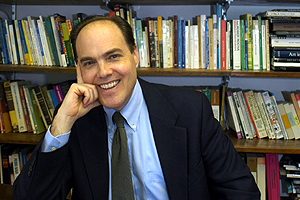
Harvard University, PhD '96
BIOGRAPHY
Emilio Kourí's main scholarly interest is in the history of rural Mexico since Independence, including society, economy, politics, culture, and the law. He is the author of A Pueblo Divided: Business, Property, and Community in Papantla, Mexico. It tells the story of the strife-ridden transformation of rural social relations in the Totonac region of Papantla during the course of the nineteenth century, paying particular attention to how the progressive development of a campesino-based international vanilla economy changed and ultimately undermined local forms of communal landholding. A Pueblo Divided received the 2005 Bolton-Johnson Prize from the Conference on Latin American History (CLAH) and the 2005 Erminie Wheeler-Voegelin Prize (Honorable Mention) from the American Society for Ethnohistory. He is also the editor of En busca de Molina Enríquez: cien años de Los Grandes Problemas Nacionales and co-editor of Revolución y exilio en la historia de México: Homenaje a Friedrich Katz.
He is at work on a three-volume history of communal landholding in Mexico. Volume One examines the evolving meaning and practice of communal land tenure in Mexican villages during the 18th and 19th centuries, focusing on changes brought about by agricultural commerce and commodification, population growth and mobility, socio-economic differentiation within and beyond villages, and the haphazard implementation of a multiplicity of liberal disentailment laws. Volume Two focuses on the Zapatista movement of the Mexican Revolution, offering a revisionist interpretation of its agrarian and political goals and practices and of its place in the land reform that would follow its demise. Volume Three explains the legal, political, and ideological origins of the collective land-grant community (ejido) created by the Mexican Revolution between 1915 and 1934. By 1992, when a constitutional amendment ended the redistribution program, more than two thirds of Mexico’s arable lands and forests were at least nominally in the hands of these land-grant communities—the most extensive state-managed land tenure transformation in the history of modern Latin America. Historians have long regarded the communal character given to ejido property as a return to forms of social organization rooted in Mexico’s indigenous past, and have considered it to be the fulfillment, at least in principle, of what villagers like Emiliano Zapata had long demanded and fought for. Against prevailing interpretations, Volume Three argues that the new ejido of the Revolution was not what country people (and especially the Zapatistas) had battled for. Rather, it was the piecemeal product of idealized notions of indigenous communal organization and historical practice hastily contrived by the "progressive" elites who won the Revolution and who were then compelled in fits and starts to make expedient agrarian reforms in order to build sorely needed popular political allegiances.
He teaches classes and seminars on land reforms, rural ecologies and social movements, indigenous societies, and the history of agrarian thought, as well as general courses on Latin American and Latino/a history, and is director of the Katz Center for Mexican Studies.
Recent Course Offerings
-
Tropical Commodities in Latin America
-
Latin American History Seminar
-
Zapatista Social Movements, Old and New
-
Agrarian Reform in Twentieth-Century Mexico
-
The History of Mexico, 1876 to the Present
-
Pre-Columbian and Early Colonial Latin America
-
US Latinos: Origins and Histories
-
Latin American Civilizations
Recent Research / Recent Publications
- "On the Mexican Ejido." Humanity 11.2.
- “Chico Franco y Nicolás Zapata.” Revista NEXOS (August 2019).
- “El alma perdida del Plan de Ayala.” Revista NEXOS (July 2019).
- "La caja de hojalata." Revista NEXOS (June 2019).
- "El ejido de Anenecuilco." Revista NEXOS (May 2019).
- "La historia al revés." Revista NEXOS (Apr. 2019).
- "Sobre la propiedad comunal de los pueblos: De la Reforma a la Revolución." Historia Mexicana (264) 66, no. 4 (Apr.–June 2017): 1,923–60.
- "La promesa agraria del artículo 27.” Revista NEXOS (Feb. 2017).
- "La invención del ejido." Revista NEXOS (Jan. 2015).
- "Claroscuros de la reforma agraria mexicana." Revista NEXOS (Dec. 2010).
- Revolución y exilio en la historia de México: Homenaje a Friedrich Katz. Coedited with Javier Garciadiego. Mexico: Ediciones Era, coedition with the Colegio de México and the Katz Center for Mexican Studies, 2010.
- Editor. En busca de Molina Enríquez: cien años de Los Grandes Problemas Nacionales. Mexico: coedition with the Colegio de México and the Katz Center for Mexican Studies, 2009.
- "Manuel Gamio y el Indigenismo de la Revolución Mexicana." In Historia de los intelectuales en América Latina, vol 2, edited by Carlos Altamirano. Buenos Aires: Katz Editores, 2010
- "John Womack: sobre historia e historiadores." Revista Temas (2008). Interview.
- "Aspectos económicos de la desamortización de las tierras de los pueblos." In España y México, ¿Historias económicas paralelas?, edited by Rafael Dobado, Aurora Gómez Galvarriato, and Graciela Márquez. Mexico City: Fondo de Cultura Económica, 2007.
- A Pueblo Divided: Business, Property, and Community in Papantla, Mexico. Stanford: Stanford University Press, 2004.
- "Interpreting the Expropriation of Indian Pueblo Lands in Porfirian Mexico: The Unexamined Legacies of Andrés Molina Enríquez." The Hispanic American Historical Review 82, no. 1 (Feb. 2002).
- "El comercio de exportación en Tuxpan, 1870–1900." In El siglo XIX en las Huastecas, México, edited by Antonio Escobar Ohmstede and Luz Carregha Lamadrid. Mexico City: Centro de Investigaciones y Esudios Superiores en Antropología Social, 2002.
- "Economía y comunidad en Papantla: reflexiones sobre 'la cuestión de la tierra' en el siglo XIX." In Estructuras y formas agrarias en México: del pasado al presente, edited by Antonio Escobar Ohmstede and Teresa Rojas Rabiela, 197–214. Mexico City: Centro de Investigaciones y Esudios Superiores en Antropología Social, 2001.
- "La vainilla de Papantla: Agricultura, comercio y sociedad rural en el siglo XIX." Signos Históricos 3 (2000).
- "Lo agrario y lo agrícola: reflexiones sobre el estudio de la historia rural posrevolucionaria." Boletín del Archivo General Agrario 3 (July 1998).
- Joins panel discuss on Mexico's presidential election, Chicago Council on Global Affairs, Jan. 28, 2019
- Delivers a talk on "Friedrich Katz Agraian Mexico," Freie Universität Berlin
- Discusses Article 27 of the Constitution of Mexico, Revista NEXOS, Feb. 2017
- Discusses agrarian reforms, "La invención del ejido," iRevista NEXOS, Jan. 2015
- Hosts the XIV Reunión Internacional de Historiadores de México as director of the Katz Center for Mexican Studies, University of Chicago
- Advised curators on the exhibit, "Researching Mexico: University of Chicago Field Explorations in Mexico, 1896–2014," Special Collections. Seonaid Valiant, PhD '14, cocurated the show.

Harvard University, PhD '99
BIOGRAPHY
I am a historian of inequality and its persistence. I specialize in the study of Brazil and Latin America, and focus particularly on informality, cities, citizenship, law, migration, race, slavery and its afterlives.
My first book, A Poverty of Rights (Stanford, 2008), examines how weak citizenship rights and residential informality came to define urban poverty, popular social struggles, and the political dynamics of inequality in modern Brazil. It received book awards from the Social Science History Association, the Urban History Association, the Conference on Latin American History, and the Brazilian Studies Association.
A volume I coedited with Bryan McCann and Javier Auyero, Cities from Scratch (Duke, 2014), explores the many ways in which poverty and informality have shaped the Latin American urban experience. My essay, "A Century in the Present Tense," explores the intellectual history of the informal city, arguing that slums and shantytowns are dynamic historical phenomena in their own right rather than perpetual symptoms of current crises. In various other essays and ongoing research, I have focused on informality's relationship to developmentalism and political liberalism, slavery, racial inequality in law and urban space, criminal law, internal migrations, and the relationship between the urban poor and Brazil’s political left.
Along with Brazilian historian Keila Grinberg, I have edited a volume entitled The Boundaries of Freedom, which brings together essays by leading Brazilian and Brazilianist scholars of slavery and its afterlives. My own essay, “Slavery, Freedom and the Relational City,” focuses on how unfreedoms born of slavery continued to bind urban free and freedpeople during Brazil’s age of abolition.
My current book, Intimate Inequalities: Urbanism, Slavery, and Bounded Freedom in a Brazilian City, explores the historical co-evolution of urbanism and informality. The book is based in Recife, Brazil, a northeastern city that came to be seen as both the capital of Brazilian underdevelopment and the incubator of some of the country's most innovative social and cultural movements. Recife originated as a slave city, and the social and power relations that had sustained slavery continued to structure it long after abolition in 1888. Like many other cities across the globe, Recife evolved as a place where modern technologies, economies, and liberal institutions coexisted with and depended upon urban informality. Formal institutions and economies were embedded in an essentially relational city, in which personal connections mediated economic and political life and deep inequality structured vital (and often violent) intimate interdependencies. In the twentieth century, relational power proved remarkably adaptable, inhabiting liberal institutions and radical social movements, structuring "political society," and doing much to explain both social mobility and inequality's resilience. In exposing the microhistory of this phenomenon in Recife, I explore the emergence of urban informality as part and parcel of modern governance and bring into a focus a paradigm of urban modernity that shapes city life across the globe.
Other ongoing projects focus on the "Rights to the City" movement in law, political philosophy, and practice; and the global history of urban informality through a collaborative project entitled "La Ville informelle au XXe siècle: politiques urbaines et administration des populations."
At Chicago, I am part of the Faculty Advisory Committees for the Mansueto Institute for Urban Innovation, the Art and Architecture Committee and the Latin America Faculty Working Group; and I am a Faculty Affiliate at the Center for Latin American Studies and the Center for the Study of Race, Politics, and Culture. Outside of the University, I serve on the editorial boards of Past & Present and the Journal of Latin American Studies, as well as the international Advisory Committee for the Centro de Estudos da Metrópole in São Paulo and the board of the Urban History Association. My teaching focuses both on my core research interests and on the larger histories of Brazil, Latin America, cities, and social inequality. Before coming to Chicago, I taught at Amherst College and Northwestern University.
Recent Research / Recent Publications
- The Boundaries of Freedom: Slavery, Abolition, and the Making of Modern Brazil, co-edited with Keila Grinberg. Cambridge University Press, 2022.
- Cities from Scratch: Poverty and Informality in Urban Latin America, co-edited with Bryan McCann, and Javier Auyero. Durham, NC: Duke University Press, 2014.
- A Poverty of Rights: Citizenship and Inequality in Twentieth-Century Rio de Janeiro. Stanford: Stanford University Press, 2008 (paperback, 2011).
- The Boundaries of Freedom: Slavery, Abolition, and the Making of Modern Brazil, co-edited with Keila Grinberg, in production, Cambridge University Press.
- “Historicizing Informal Governance in 20th Century Brazil,” Contemporary Social Science, May 2021.
- "A ética do silêncio racial no contexto urbano: políticas públicas e desigualdade social no Recife, 1900-1940," Anais do Museu Paulista, 28 (2020): 1-45.
- “From the Mocambo to the Favela: Statistics and Social Policy in Brazil’s Informal Cities,” Histoire et Mesure 34, no. 1 (2019): 15-40.
- “Favelas and Politics in Brazil, 1890-1960,” in William Beezley, ed., Oxford Research Encyclopedia, Latin American History, Oxford University Press, 2019.
- "Urban Informality and the Paradoxes of Developmental State Building," in State and Nation Making in Latin America and Spain: The Rise and Fall of the Developmental State, edited by Miguel Centeno and Agustín Ferraro. Cambridge: Cambridge University Press, 2018.
- "Ethos and Pathos in Millennial Brazil." Latin American Research Review 53, no. 2 (June 2018): 394–402.
- "Law, Silence and Racialized Inequalities in the History of Afro-Brazil," with Keila Grinberg and Hebe Mattos. In Afro-Latin American Studies: An Introduction, edited by Alejandro de la Fuente and George Reid Andrews. Cambridge: Cambridge University Press, 2018, 130–78.
- "Beyond Insurgency and Dystopia: The Role of Informality in Brazil’s Twentieth-Century Urban Formation." In Public Goods versus Economic Interests: Global Perspectives on the History of Squatting, edited by Freia Anders and Alexander Sedlmaier. New York: Routledge, 2016, 122–49.
- "The Red Menace Reconsidered: A Forgotten History of Communist Mobilization in Rio's Favelas, 1945–1964." Hispanic American Historical Review 94, no. 1 (2014): 1–33.
- "Urban History." In Oxford Bibliographies Online (2013)
- "Democracy, Thuggery, and the Grassroots: Antoine Magarinos Torres and the União dos Trabalhadores Favelados in the Age of Carioca Populism." Nuevo Mundo–Mundos Nuevos, Colloquium: "Repensando los populismos en América Latina," February 2013.
- "Partindo a cidade maravilhosa" (Dividing the Marvelous City). In Quase cidadão: histórias e antropologias da pós-emancipação no Brasil, edited by Flávio dos Santos Gomes and Olívia Maria Gomes da Cunha. Rio de Janeiro: Editora da Fundação Getúlio Vargas, 2007, 419–50.
- "Direitos por lei, ou leis por direito?" (Rights by Law or Laws by Right?). In Direitos e justiças no Brasil: Histórias plurais, edited by Silvia Lara and Joseli Mendonça, 417–56. São Paulo: UNICAMP Press, 2006.
- "Slandering Citizens: Insults, Class and Social Legitimacy in Rio de Janeiro's Criminal Courts." In Honor, Status, and the Law in Modern Latin America, edited by Sueann Caulfield, Lara Putnam, and Sarah Chambers, 176–200. Durham, NC: Duke University Press, 2005.
- "Quase Pretos de Tão Pobres? Race, Class, and Criminal Justice in Rio de Janeiro." Latin American Research Review 39, no. 1 (February 2004): 31–59.
- Profiled on BBS Brasil on teaching Brazilian history
- Part of the core team of La Ville informelle au XXe siècle
- Discusses contemporary urban studies with Marco Garrido, Dialogo, Winter 2018
- Discusses Urban Poverty in Latin America [video, 3 minutes]

Stanford University, PhD '86
Prof. Borges has retired and no longer directs BA theses or accepts new graduate students.
BIOGRAPHY
Dain Borges works on nineteenth- and twentieth-century Latin American culture and ideas. His current research project, "Races, Crowds, and Souls in Brazilian Social Thought, 1880–1920," centers on the ways in which Brazilian intellectuals used race sociology and social psychology to understand popular religion and politics. He teaches seminars and courses on Latin American history, comparative nineteenth-century transformations, ideologies of national identity, and culture in the African diaspora.
Recent Research / Recent Publications
-
“Mockery and Piety in Eça de Queirós and Machado de Assis.” Revista de Estudos Literários [Coimbra] (2016).
-
“Catholic Vanguards in Brazil.” In Local Church, Global Church: Catholic Activism in Latin America from Rerum Novarum to Vatican II, edited by Stephen J. C. Andes and Julia G. Young. Washington, DC: Catholic University of America Press, 2015.
-
"Healing and Mischief: Witchcraft in Brazilian Law and Literature, 1890–1922." In Crime and Punishment in Latin America, edited by Carlos Aguirre, Gilbert Joseph, and Ricardo Salvatore. Durham, NC: Duke University Press, 2001.
-
Esau and Jacob, by Machado de Assis. New York: Oxford University Press, 2000 (editor).
-
"A Mirror of Progress." In The Brazil Reader: History, Culture, Politics, edited by Robert M. Levine and John J. Crocitti. Durham, NC: Duke University Press, 1999.
-
"Intellectuals and the Forgetting of Slavery in Brazil." Annals of Scholarship 11 (1996).
-
"The Recognition of Afro-Brazilian Symbols and Ideas, 1890–1940." Luso-Brazilian Review 32 (1995).
-
"Puffy, Ugly, Slothful, and Inert: Degeneration in Brazilian Social Thought, 1880–1940." Journal of Latin American Studies 25 (1993).
-
The Family in Bahia, Brazil, 1870–1945. Stanford: Stanford University Press, 1992.
-
Discusses "Natural Disasters and Social Responses" at the Summer Teacher Institute, University of Chicago [video, 50 mins]

University of Virginia, PhD '15
BIOGRAPHY
Mary Hicks is a historian of the Black Atlantic, with a focus on transnational histories of race, slavery, capitalism, migration and the making of the early modern world. Her first book, Captive Cosmopolitans: Black Mariners and the World of South Atlantic Slavery, 1721-1835, reimagines the history of Portuguese exploration, colonization and oceanic commerce from the perspective of enslaved and freed black seamen laboring in the transatlantic slave trade. As the Atlantic world’s first subaltern cosmopolitans, black mariners, she argues, were integral in forging a unique commercial culture that linked the politics, economies and people of Salvador da Bahia with those of the Bight of Benin.
More broadly, she seeks to interrogate the multiplicity of connections between West Africa and Brazil through the lens of mutual cultural, technological, commercial, intellectual and environmental influences and redefine how historians understand experiences of enslavement and the middle passage. In addition to investigating the lives of African sailors, she also explores the cultural and religious sensibilities of enslaved and freed African women in living in 19th century Salvador da Bahia. Along these lines, her second book will detail the emergence and elaboration of new gendered and racialized subjectivities in the wake of Portugal’s initiation of trade with West Africa in the fifteenth century.
Prof. Hicks received her B.A. from the University of Iowa and her Ph.D. from the University of Virginia, where she was a recipient of the Jefferson Fellowship. She has also received the Ford Foundation Dissertation Fellowship and the Mamolen Fellowship at the Hutchins Center at Harvard University. She is the winner of the Southern Historical Association’s Latin American & Caribbean Section Dissertation Prize and been a finalist for the CGS/Proquest Distinguished Dissertation Award for the Humanities and Fine Arts.
Recent Research / Recent Publications
-
Captive Cosmopolitans: Black Mariners and the World of South Atlantic Slavery, 1721-1835 (under contract with Omohundro Institute of Early American History & Culture for The University of North Carolina Press), forthcoming
-
“Transatlantic Threads of meaning: West African Textile entrepreneurship in Salvador da Bahia, 1770- 1870,” Slavery & Abolition 41:4 (December 2020), 695-722
-
“Financing the Luso-Atlantic Slave Trade: Collective Investment Practices from Portugal to Brazil, 1500-1840,” Journal of Global Slavery 2:3 (2017), 273-309
-
“João de Oliveira’s Atlantic World: Mobility and Dislocation in Eighteenth-Century Brazil and the Bight of Benin,” in The Many Faces of Slavery: New Perspectives on Slave Ownership and Experiences in the Americas Eds. Lawrence Aje and Catherine Armstrong, (London: Bloomsbury Press, 2019)
-
“Middle Passage,” in 400 Souls, Eds. Keisha N. Blain and Ibram X. Kendi (New York: Basic Books, 2021)
-
Review of Sharla Fett’s Recaptured Africans: Surviving Slave Ships, Detention and Dislocation in the Final Years of the Slave Trade in Black Perspectives (November 16, 2018)
-
Review of Hazel V. Carby’s Imperial Intimacies: A Tale of Two Islands in Black Perspectives (February 5, 2021)

Stanford University, PhD '92
Professor Tenorio has been a scholar for over two decades, including thirteen years at the University of Chicago.
Recent Research / Recent Publications
Las ruinas de la historia: el culto a los monumentos y a su destrucción, Madrid, Alianza Editorial, 2023.
Elogio de la impureza: Promiscuidad e historia en Norteamérica, Mexico City, Siglo XXI, 2023.
A flor de pie, Xalapa, Universidad de Veracruz, 2020.
Clio’s Laws: On History and Language, Austin, The University of Texas at Austin, 2019.
La Paz: 1876, Mexico City, Fondo de Cultura Económica, 2018.
Latin America: The Allure and Power of an Idea, Chicago, University Press, 2017. Paperback Edition, 2020
“Hablo de la ciudad”: los principios del siglo XX desde la Ciudad de México, Mexico City, Fondo de Cultura Económica, 2017. (Spanish translation of “I Speak of the City”).
Maldita lengua, Madrid, La Huerta Grande, 2016.
“I Speak of the City”: Mexico City at the Turn of the Twentieth Century, Chicago, The University of Chicago Press, 2013. Paper back, March, 2015.
Honorary Mention, The Bolton-Johnson Prize 2013, The American Historical Association.
Spiro Kostof Book Award, Society of Architectural Historians, 2015. Gordon J. Laing Prize, The University of Chicago Press, 2015
Culturas y memoria, Mexico City, Barcelona, Tusquets, July, 2013.
Historia y Celebración, México y sus centenarios, Mexico City, Tusquets, 2009.
Historia y Celebración. América y sus centenarios, Barcelona, Tusquets, 2010. New edition of the 2009 version, published in Spain.
El Porfiriato: Una propuesta y un balance, written in collaboration with Aurora Gómez, Mexico City, Fondo de Cultura Económica, 2006.
El urbanista, Mexico City, Fondo de Cultura Económica, 2004.
De cómo ignorar, Mexico City, Fondo de Cultura Económica, 2000.
Argucias de la historia: siglo XIX, cultura y “América Latina,” Mexico City, Barcelona, Buenos Aires, Editorial Paidós, 1999.
Artilugio de la nación moderna. México en las exposiciones universales, 1880-1930, Mexico City, Fondo de Cultura Económica, 1998. (An expanded and edited translation of Mexico at The World’s Fairs)
Mexico at World's Fairs: Crafting a Modern Nation, Berkeley, The University of California Press, 1996. Re-edited, The University of California Press Voices Revived, 2018
“Sobre la paz en la historia,” Segle XX. Revista Catalana d´Hitòria, vol. 15 (2022), pp. 119.
“Los conceptos son palabras y agarrosas. Concepts are words, and catchy at that,” forthcoming Istor.
“Review Essay: Conceitos and Conceptos: The Wight of Words in the Iberian World,” forthcoming, Journal of the History of Ideas.
“Estados Unidos en Historia Mexicana y algo más,” Historia Mexicana, no. 281 (JulySeptember 2021).
“History on Foot: Walking Mexico City,” Current History (February 2020).
“Latinoamérica: el encanto y el poder de una idea,” Prismas. Revista de Historia Intelectual, no. 22 (2018).
“Latinoamérica: sus connotaciones esenciales,” Istor, 67 (December 2016).
“La C por la K: El Barret Mexicà en las Ramblas” Cuadernos Hispanoamericanos, no. 781-82 (2015), pp. 105-120.
“O Campus, My Campus!,” Istor (Fall, 2014), pp. 20-45.
“A Lost Opportunity: Carlos Fuentes, the Essay, and Mexico in English,” La Habana Elegante, no. 55 (Spring-Summer, 2014).
“América Latina: a ideia, mais uma vez,” Interseções: Revista de Estudos Interdisciplinares, v. 14, n. 2 (2013).
“Alrededor de 1812: las Américas y la monarquía,” Istor, no 51 (Winter 2012)
“Un recuerdo,” in “El siglo XIX de Tulio Halperín,” Prismas, Revista de Historia Intelectual, no. 15 (2011), pp. 237-240.
“Poesia e historia,” Istor, no. 47 (Winter, 2011).
“De piojos, ratas y mexicanos,” Istor, no. 41 (Summer, 2010), pp. 1-40
“The Riddle of a Common History: The United States in Mexican Textbooks Controversies,” Context, vol. 1, no. 1 (Spring 2009), pp. 103-131.
“Around 1919 and in Mexico City,” Working Paper, CIDE, April 2009, pp. 95.
“Algo más que una entrevista, Díaz-Creelman,” Istor, no. 39 (Spring 2009), pp. 117-128.
“On Monolingual Fears,” Public Culture, vol. 19, no. 3 (2007), pp. 425-432.
“On the Limits of Historical Imaginations: North America as a Historical Essay,” International Journal, vol. 61, no. 2 (Summer 2006), pp. 567-587.
“Identidad, nuestra preclara obsesión. Un diálogo y algo más,” Mauricio Tenorio Trillo (moderator), Roger Bartra, Partha Chatterjee, Robin Kelley, Fernando Escalante, and Sanjay Subrahmanyam, in Istor, Centro de Investigación y Docencia Económicas, A.C., no. 11, 2003.
“World’s Fairs: The Seven Deadly Sins,” in Volcher Barth edited issue of the Bulletin of the Bureau of International Exhibitions, June 2002, 40 pp.
Caminhando para a "desestadunização" da história dos Estados Unidos: um diálogo,” article and dialogue with David Thelen and Thomas Bender, in Estudos Históricos, Fundaçao Getulio Vagas, Rio de Janeiro, Brasil, No. 27 (2001), pp 52-77.
“Historia de las Historias en Estados Unidos,” in Istor, Centro de Investigación y Docencia Económicas, A.C, Mexico City, Winter 2000, 62-81.
"Stereophonic Scientific Modernism. Social Science Between Mexico and the U.S., 18801920,” Journal of American History, vol. 86, nom. 3 (December 1999), pp. 1156-118.
"The Cosmopolitan Mexican Summer, 1920-1949" (Review-essay), Latin American Research Review, vol. 32, no. 3 (1997), pp. 224-242.
"De Encuentros y Desencuentros: La Escritura de la Historia en Estados Unidos. Ensayo de una visión forastera," in Historia Mexicana, El Colegio de México, Mexico City, vol. 46, no. 4 (1996), pp. 889-925.
"1910 Mexico City: Space and Nation in the City of the Centenario," in Journal of Latin American Studies, Cambridge, United Kingdom, vol. 28 (February 1996), pp. 75-104.
"Estados Unidos: Ciudadanía y cultura en tiempos de desazón. El debate de los noventa," Estudios Sociológicos, El Colegio de México, Mexico City, vol. 13, no. 39 (SeptemberDecember 1995), pp. 501-530.
"Del nacionalismo y México," in Política y Gobierno, Centro de Investigación y Docencia Económicas, A.C , Mexico City, vol. II, no. 2 (Second Semester, 1995), pp. 313-334.
"Ciencia e Historia: A la cacería de sentidos comunes,” in Memorias de la Academia Mexicana de la Historia, Correspondiente a la Real de Madrid, Academia Mexicana de la Historia, Mexico City, (1994), pp. 1-30.
"A Tropical Cuauhtémoc: Celebrating the Cosmic Race at the Gunabara Bay," in Anales del Instituto de Investigaciones Estéticas, Universidad Nacional Autónoma de México, Mexico City, no. 65 (1994), pp. 93-137.
"Um Cuauhtémoc Carioca: Comemorando o Centenário de Independência do Brasil e a raça cósmica,” in Estudos Históricos, Fundação Getúlio Vargas, CEPDOC, Rio de Janeiro, vol. 7. No. 14 (1994), pp. 123-148.
"Gringos Viejos: Radicales norteamericanos en los años treinta y su visión de México (una interpretación)," in Secuencia, Instituto de Investigaciones Históricas José María Luis Mora, Mexico City, no. 21 (September-December, 1991), pp. 95-116.
"América: Historia y Conmemoración. Un comentario Historiográfico," in Revista Estudios Históricos, Instituto Tecnológico Autónomo de México, Mexico City, no. 25 (Summer 1991), pp. 29-41.
"Bartolomé Mitre y Vicente Fidel López. El Pensamiento Historiográfico Argentino en el siglo XIX," in Secuencia, Instituto de Investigaciones Históricas José María Luis Mora, Mexico City, no. 16 (January-April 1990), pp. 97-121.
"Profissão: Latin-Americanist. Richard M. Morse e a historiografia norteamericana da América Latina," in Estudos Históricos, Fundação Getúlio Vargas, CEPDOC, Rio de Janeiro, vol. 2 no. 3 (1989), pp. 102-132.
Publishes A Flor de Pie (Universidad Veracruzana, 2020)
Publishes Clio's Laws: On History and Language (UT Press, 2019)
Awarded a 2019 Quantrell Award for Excellence in Undergraduate Teaching
Publishes La Paz: 1876 (FCE, 2018)
Publishes Latin America: The Allure and Power of an Idea (Chicago, 2017)
Profiled after offering the 2022 Lozano Long Conference keynote at the University of Texas at Austin
Awarded 2015 Laing Prize by the University of Chicago Press
Considers Recent Chronicles of Mexico City for Public Books
Discusses I Speak of the City. Mexico City at the Turn of the Twentieth Century (Chicago, 2012) with el Colegio de México [video, 10 minutes]